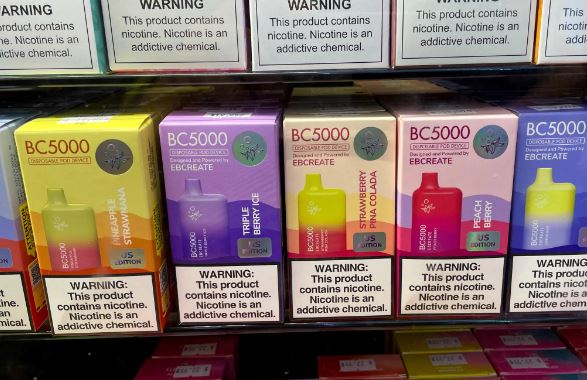A coalition of law enforcement agencies is set to address the burgeoning market of illegal e-cigarettes, responding to pressure from antismoking groups, lawmakers, and the tobacco industry. This move aims to curb the influx of vaping devices, particularly those favored by adolescents.
The Justice Department and the Food and Drug Administration (FDA) announced this initiative, which will target fruit- and candy-flavored vapes containing high levels of addictive nicotine. The coalition includes the Bureau of Alcohol, Tobacco, Firearms and Explosives (ATF), the U.S. Marshals Service, the Federal Trade Commission (FTC), and the U.S. Postal Service. This effort will utilize federal laws that impose significant fines and potential jail terms.
Previously, the FDA’s enforcement efforts primarily involved issuing warning letters and limited penalties to vendors such as gas station and convenience store owners, instructing them to cease selling these products. These measures have been criticized as inadequate by congressional lawmakers and others who advocate for more robust action to prevent illegal e-cigarettes from entering the U.S.
Traditional tobacco companies, including Reynolds American, have also urged the FDA, which regulates tobacco, to eliminate illicit products that compete with their own e-cigarettes. However, their advocacy for flavored vape enforcement has not extended beyond the U.S. border. British American Tobacco, Reynolds’ parent company, has marketed its Vuse Go vapes in flavors like Mango Ice and Blue Raspberry in 46 countries.
Although adolescent vaping rates have decreased from their peak levels reported in national surveys about five years ago, public health experts remain concerned about nicotine addiction’s impact on the adolescent brain.
Senator Dick Durbin, Democrat of Illinois and majority whip, is convening a Judiciary Committee hearing to focus on combating youth vaping and improving enforcement. Top officials from the Justice Department and FDA have been invited to testify.
Young people show a strong preference for flavored vapes, enjoying the novelty and variety. According to the CDC Foundation, about 6,000 unique vape varieties were sold in the U.S. market by the end of 2023. Flavored vape sales have surged, reaching nearly $400 million at the end of 2023 from about $217 million in early 2020.
During this period, vape devices have increased in size, offering high levels of nicotine and up to 8,500 puffs per device, comparable to the nicotine content of a cigarette carton.
To date, the FDA has authorized the sale of only 23 tobacco-flavored vaping items, including NJOY by Altria and Vuse products by R.J. Reynolds Vapor Company. The FDA is still reviewing Juul’s applications and recently lifted a previous order denying the company permission to sell its devices.
Legacy tobacco companies have awkwardly aligned with public health groups, urging the FDA to intensify its fight against illegal vapes, which dominate overall market sales.
The Campaign for Tobacco-Free Kids also supported the creation of the new law enforcement unit, calling for product seizures, import restrictions, and criminal prosecutions.

